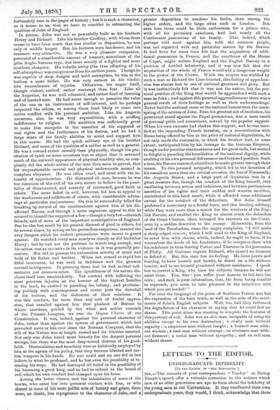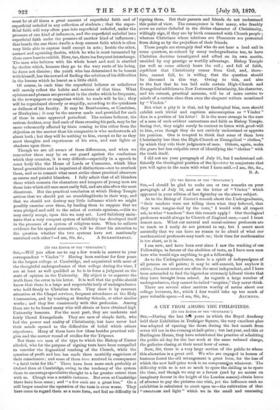LETTERS TO THE EDITOR.
UNDERGRADUATE INFIDELITY.
[TO THE EDITOR OP "THE SPECTATOR.")
Sur,—The remarks of your correspondent " Vindex " on Bishop Temple's speech offer a valuable correction to the notions which men of an older generation are apt to form about the infidelity of the young men at our Universities. If they recollected their own undergraduate years, they would, I think, acknowledge that there
must be at all times a great amount of superficial faith and of superficial unbelief in any collection of students ; that the super- ficial faith will very often pass into superficial unbelief, under the pressure of one kind of influences, and the superficial unbelief into superficial faith under the pressure of another kind of influences ; that beside the one there dwells a deep earnest faith which is often very little able to express itself except in acts ; beside the other, earnest and agonizing doubts, which he who is most tormented by them cares leastto exhibit. Here, too, there isa frequent interchange. The man who believes with his whole heart and soul is startled by doubts which, because they go to the very roots of his being, he dares not dismiss ; the youth who has determined to be honest with himself, has the reward of finding the solution of his difficulties in the lessons which he learnt as a little child.
Of course, in each time the superficial believer or unbeliever will merely reflect the habits and notions of that time. What opinions and phrases are prevalent in the circles which he frequents, in the newspapers or magazines which he reads will be his ; they will be reproduced cleverly or stupidly, according to the quickness or dullness of his faculty. It may be Benthamism, or Comteism, or Huxleyism ; it may be the answer made and provided for each of these in some approved periodical. The serious believer, the serious doubter, may find each of these crossing his path, may be far more vehemently affected by hints coming to him either from the objection or the answer than his companion is who understands all about both ; but they will be nothing to him, except so far as they meet thoughts and experiences of his own, and cast lights or shadows upon those.
Though we are all aware of these differences, and when we remember them may be on our guard against the confusions which they occasion, it is very difficult—especially in a speech to some body like the House of Lords or Commons, which likes broad generalities and is impatient of distinctions—not to overlook them, and so to commit what must strike closer practical observers as coarse and painful blunders. I fully admit that of all blunders those which concern the characters and tempers of young men are those into which old men moat easily fall, and are also often the most disastrous. But the practical conclusion at which Bishop Temple arrives that we should put no stumblingblocks in their way, and that we should not destroy any little influence which we might possibly exercise over them, by leading them to suppose that we were pledged and sold to the safest of certain opinions,—this we may surely accept, upon this we may act. Lord Salisbury main- tains that a very compact system of infidelity has developed itself in the presence of a system of religious tests. When he collects evidence for his special committee, will he direct his attention to the question whether the two systems have not continually
sustained each other ?—I am, Sir, &c., A SEXAGENARIAN.































 Previous page
Previous page